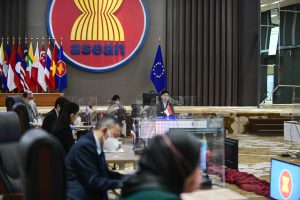For too long, the relations between the Association for Southeast Asian Nations (ASEAN) and the European Union have remained an untold story. ASEAN and the EU have been partners since 1977. As the two most advanced and integrated regional organizations in the world, they understand each other on a deep level. Both know how challenging it is to turn the vision of a regional community based on common rules into a practical reality for all citizens.
On December 1, 2020, the ASEAN-EU partnership was upgraded to the strategic level. Two years have since passed and our leaders are about to meet in Brussels to commemorate the 45th anniversary of our diplomatic ties. It is high time to reflect on the last two years and set the priorities going forward.
Much has happened since we decided to become strategic partners. A global pandemic exposed the fragility of international value chains, while the Russian war of aggression against Ukraine is putting the entire rules-based international order under serious stress. The strategic rivalry between the United States and China intensifies as we speak. How ASEAN and the EU act and react, separately or together, will define the destiny of the more than one billion people who call our two regions home.
If our relationship really is to be strategic, issues of concern to one must be considered an issue of concern to the other. Where a joint approach may not be possible, a common assessment of geopolitical shocks should at the very least transpire between our two blocs.
Nowhere is the rivalry between the U.S. and China more evident than in the South China Sea. In this dispute, ASEAN is hesitant to unconditionally align with one country or the other. Instead, the bloc invokes its “centrality,” which has long made it the platform of choice for economic diplomacy. The Indo-Pacific strategy, adopted by the EU in September last year, testifies to Brussels’ clear support and respect for the centrality of ASEAN.
At the same time, China has become more aggressive and militarily active in challenging the boundaries of its neighbors’ territorial waters. The EU cannot and will not allow international law and maritime security to be subverted by individual countries. We have a serious stake in the region. After all, 40 percent of the EU’s foreign trade passes through the South China Sea, making peace and stability in the region a European priority. What happens in this region echoes in Europe.
In this context, maritime security has long been a shared priority for both the EU and ASEAN. Beyond that, piracy, smuggling, illegal immigration, disaster management and the impact of pollution and climate change are frequent topics on the agenda. The upcoming summit offers ample opportunity to strategize the elements of our future security and defense cooperation. Last year, for example, we saw Vietnam sign an agreement that ratified the country’s participation in military and civilian missions of the EU. Hopes run high for the summit to sow the seeds for further engagement along these lines.
With Europe under pressure to reinvent its security architecture following the Russian war of aggression against Ukraine, the EU’s 27 member states may well learn from ASEAN and its concept of concentric circles, whereby cooperation within a smaller grouping strengthens ASEAN’s participation within a larger grouping.
The second priority for ASEAN, as well as for Europe, is economic recovery. The long-term implications of the rivalry between the U.S. and China are already materializing. The attempted decoupling of the two superpowers in high-tech and telecommunications, banking, and finance could force Southeast Asian countries to make difficult choices. At the same time, disruptions in global value chains have hit ASEAN manufacturing hard, forcing Southeast Asian firms to reflect on their position.
As the number one source of foreign direct investment in ASEAN, the EU is determined to accelerate economic recovery in the region. First and foremost, this means pursuing our trade agenda. With more than €215.9 billion of trade in goods in 2021, ASEAN as a whole represents the EU’s third largest trading partner outside Europe. Equally, the EU is ASEAN’s third largest trading partner, accounting for around 10.6 percent of ASEAN trade. Free trade agreements between the EU and both Singapore and Vietnam have already come into force. Agreements with other ASEAN countries remain a priority, most notably with Indonesia, where negotiations are ongoing, and with Malaysia, Thailand, and the Philippines, where the EU has established negotiation mandates. Again, the summit presents an opportunity to pursue these agreements with renewed vigor.
Like the EU, ASEAN does not attempt to undermine multilateralism. Instead, we are united in our conviction that trade and security should follow rules-based international agreements. We do not adhere to the idea that might make right. Neither ASEAN nor the EU is willing to become part of a “sphere of influence.”
Our integration models and processes are both work in progress, they have their own specificities owing to different geographies, histories, and cultures – and they are imperfect. Yet, they do have the merit of existing.
As our heads of states and governments assemble, we are presented with an opportunity to find common ground on topics of mutual concern. The foreseen establishment of the EU-ASEAN Energy Dialogue is a viable starting point. Yet, the strategic partnership between ASEAN and the EU is not just a matter for our executive branches: parliamentarians on both sides and civil society at large are entitled to have their say. We call for a structured dialogue with a clear agenda between elected representatives from both sides. The European Parliament is willing to co-host such a dialogue, and is looking forward to engaging fruitfully with MPs from ASEAN nations.
We cannot be multilateralist on our own. We have always been and will always be stronger when we act together. The road ahead is clear: The EU is here to stay, side by side with ASEAN.

































